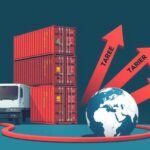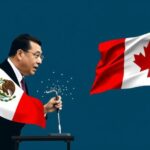The Expanding Scope of the US-China Tariff War and Public Health Implications
The United States under President Trump is intensifying its tariffs against China, claiming a severe trade imbalance and pressing for compliance on issues like fentanyl production. Chinese leaders have denounced these tariffs as unwarranted. The potential for further tariffs aims to pressure China into addressing its role in drug trafficking. Clever economic strategies are being employed by the U.S. to navigate complex trade dynamics effectively.
The ongoing tariff war between the United States and China highlights a significant economic imbalance that President Donald Trump claims has persisted for years. He argues that the U.S. has a heavy reliance on China, prompting multiple threats to intensify tariffs unless China retraces their recent increases. Most notably, Trump announced a potential 50% additional tariff on Chinese imports, further complicating trade discussions.
Chinese officials have characterized these tariffs as unprovoked, contesting Trump’s claims of economic abuse. William Lee, chief economist at the Milken Institute, noted that China’s tariff responses are seemingly strategic, designed to show strength against U.S. pressure and maintain national sovereignty amidst assertions of economic dominance by President Trump.
Indeed, Trump ties the trade deficit with China to broader issues like the fentanyl crisis, claiming that China plays a significant role in the production of precursor chemicals used in drug trafficking. This argument is supported by Peter Schweizer, who explains that these chemicals are facilitated through Mexican operations run by Chinese nationals, portraying the links between trade policies and public health.
During Trump’s initial presidency, Xi Jinping had pledged to address China’s role in the fentanyl supply chain, although these promises have not manifested into significant change. The administration believes that leveraging tariffs is an effective strategy to compel further cooperation from China on issues that impact U.S. public health, particularly regarding the imports of illicit drugs.
The U.S.-China tariff conflict illustrates the complexities of international trade and its implications for domestic issues such as public health. President Trump’s administration continues to leverage tariffs as a form of economic pressure, particularly in relation to China’s trade practices and their involvement in the fentanyl crisis. This ongoing struggle hints at the necessity for strategic policy navigation to resolve not only trade imbalances but also critical societal challenges.
Original Source: newschannel9.com








Post Comment